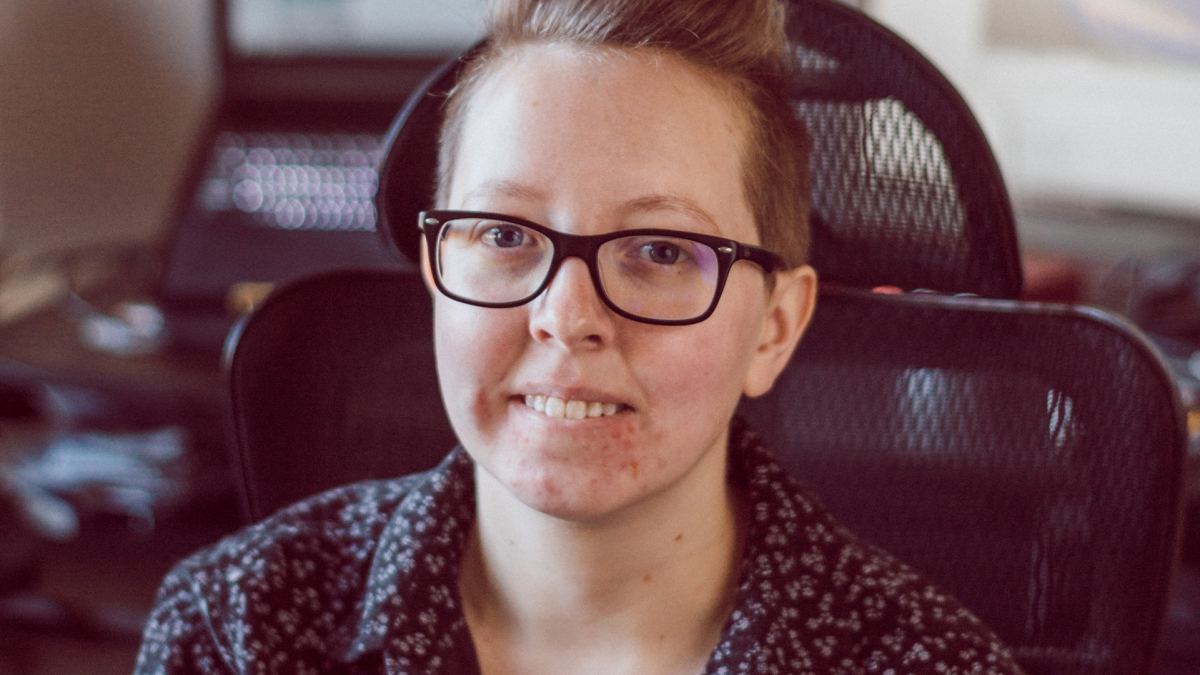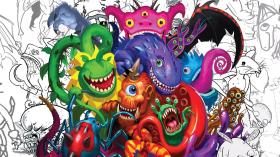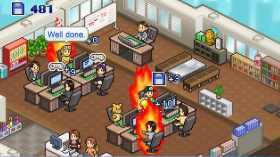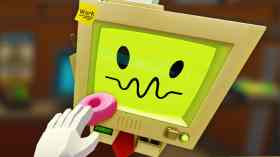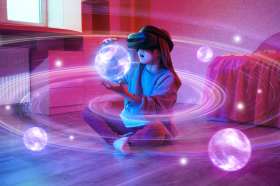Video games are made in a myriad of different ways, by a myriad of different people with different skills. From experimental artistic games to billion-dollar corporations, it takes a huge range of different skills and different people to make games as we know them. However, the public image of what a game developer does has remained stagnant. We wanted to shed some light on what working in games looks like outside of programming and lead design roles. This week, we spoke to Maize Wallin about the role of a technical audio designer in game development.
Maize is currently audio lead on the upcoming narrative title, Wayward Strand. They’ve previously worked in audio on games of all sizes, from tiny, artistic games like Max Myer’s Paint Game, to working in audio implementation on Wolfire Games’ Receiver 2 and Gearbox Studio’s loot shooter Godfall.
They also co-founded REsistjam, a game jam intended to encourage the creation of activist games, and Non-binary Zone an advocacy group for non-binary people in the game development field.
In your own words: what does a technical audio designer do? How does this differ from other audio roles, like composer or sound designers — or is there some overlap?
Like all roles in games, “technical audio” can encompass many things. But, what you would expect, is that they are the person who audio assets are delivered to, to then put into the game. They would also develop the systems and frameworks that those assets would fit into.
For example, a technical audio designer might work with a composer so that their music shifts between two loops according to how much health the player has. The technical audio person is who would actually make that happen.
Or maybe we need a footstep to change according to the environment. The technical audio person would implement the reverb zones into the game, and also all the different surfaces relevant to footsteps, and create the systems that applies the reverb to the footsteps, and chooses the footsteps based on the surface.
Sometimes there are tedious jobs, like syncing footstep cues to walking animations. But, it’s a nice relief to have these kinds of less creative jobs, as the rest of the time can require some pretty intense brain work.
Often technical audio really does overlap with composition and sound design – in small teams, it’s not unusual to have a “one person audio department”. Sound designers and composers are still required to have some knowledge about how things work, and what kinds of systems we could use, to make their own assets, even if they are just handing over .wav files! The more they know, the closer we can work together and be really empowered to make sensitive, specific, effective art.
Another cool place where technical audio and composition overlap, and is one that was really inspiring my journey because it’s done in some LucasArts games like Monkey Island and Grim Fandango – is intricate musical transitions that rely on chords or melody. For example, if a player entered a new area while the music for the old area was in the middle of a phrase, maybe we would design the system to know what chord it would have to hit, to make a seamless transition between the current chord, and the next chord of the new area.
This is where it really helps if both the composer and the technical audio person understand how to identify what chords can work, and when. It could be fine if just one of these people knew, but then it would be hard to test and verify the system is working, on the fly.
This chord system *was* going to be in Wayward Strand, but because of the way our scenes and voiceover works, we went with another solution. But, Anton Reihl and I recently worked on a really cool musical puzzle sculpture in Receiver 2, and much of our documentation actually lived in an Ableton session, where we worked out puzzle possibilities and solutions together before I copied our layout into a spreadsheet for the studio producer to look at, and then I implemented into the game. So having overlap in our skills meant that we could work not only the same musical language but with the same digital tools!
What does a career path look like for someone interested in working in audio? What kind of work did you do before working in game audio?
I always wanted to be a musician. I was going to be an awesome rock guitarist or hot jazz guitarist. But, as a teen, I picked up more instruments, and then more and more, and soon realised that I didn’t have time to be as good as I wanted to be at every instrument in the world. So I turned to composition.
During and after university studying Interactive Composition at VCA, I started doing music in games. I found that while I loved live art a lot, and directed a lot of amazing shows, it’s so expensive to tour – but many things translate into games. When performing live, you can feel and react to the audience, and we can make that happen in games too, where the player becomes a kind of unconscious DJ.
Once I graduated, I’d already gotten quite a good portfolio of a few theatre shows, a couple of documentaries and short films, but games are what really sucked me in.
Before my sole income was game audio, I had a very long and prolific time working in hospitality in Melbourne (and actually at some pretty cool places…) from 15yo to all through uni and for a while, I did data entry part time which supported my musical career. Eventually, I started teaching composition and game audio at the Australian Institute of Music and eventually moved to Box Hill Institute.
Now I still love to teach, and I do guest lectures, but university systems are brutal and have so little support for staff. I still look toward academia quite often and even filled out half a PhD application last month, but the inflexible schedule, the low pay, the intense sexism and racism and ableism, and EVERYTHING in universities… At least in games, I can choose who I work with most of the time.
Was audio for games always your goal, or has your career trajectory changed over time?
Other than seriously thinking maybe I’d start a jazz club, or that I’d be an academic, my career has been pretty game audio centric. But even then, I have one of these “portfolio careers” that a lot of arts workers are familiar with. Out of existing under capitalism, but also to cater to all my interests.
Currently and for the past few years, I’ve been trying to strike a balance between four areas I love: working in game audio, expressing myself artistically, teaching, and then the usually unpaid or underpaid advocacy.
I’ve had a lot really great artistic opportunities, where I can break away from working with a studio, and just experiment on my own. NoiseDrawers was a big (and still in my mind a bit) part of my life in 2019, and since then I’ve also been able to incorporate some non-games work into gamey talks at conferences, like my ramen song that was a part of a talk about diegetic and non-diegetic audio in games.
What was your first audio design role in games, and what surprised you about the work?
My first mini job was doing music for a mate of mine Reuben Covington, who was studying games at RMIT and at the same time I was studying composition at VCA. We actually went to primary school together and didn’t keep super in touch, but I think we must’ve run into each other recently at a gamey thing. He was making a little game about feeding cute baby farm animals to an angry set of jaws at the bottom of a cliff. I had made a lovely little lullaby type tune from a toy piano type sound, layered beneath the horrific sounds of screaming and crunching. It was pretty excellent, and I later heard that Reuben showed it to his class, and some of my colleagues today still remember it 10 years later!
In exchange, Reuben built me a little top-down game we co-designed where you walked around these musical pillars, and as you shone your torch on them the layers of the music would play. I felt like this was “walking around inside my own score”. It’s a really simple thing that is just “standard” in games now, but not something I’d been able to get my hands dirty in at the time. It was incredibly inspiring, and definitely one of the catalysts that got me into really systemic audio.
I think one of the reasons I remember this little collab so fondly, is that while there was no monetary gain, it was a really clear swap of skills that we both benefited from. It can be hard to leave space for that now.
How does someone get started on this career path?
I’m really lucky to have started in Melbourne, where there were at least a few different gamedev communities to explore and see who I vibed with. I think that’s really difficult if you are in places with less community. So a key piece of advice from me is to find communities, and don’t bother wasting time on ones that don’t suit you, you’ll just burn out, or worse end up working for them.
My other… piece of advice?… concern? Is hustle culture. But I have no idea how to talk about that really! I think I was late to realise when I could stop hustling as hard as I was? I think trying to be as objective as possible about where you’re at is so hard, especially when your income is up and down and up and down.
At some point however many years in though, I needed to test what happened if I didn’t turn up to every single conference. If I actually said no to some jobs. Would my career end? It turns out coming back from that is fine! I’m still here! I think all of us as artists or creatives think, “when is the point where I can stop constantly looking for work?” and we don’t think about “is that now?” Like, maybe THIS is the period where all your work is word of mouth, and you don’t have to LOOK all the time? It is so unreal! Everyone should get therapy or a career coach or something, to talk all this through!
Then you have to balance expressing yourself. I’ve been so fortunate to still have some fingers in the music industry and even in the arts as well. I’ve shown my own experiments in galleries and had artist residencies around the world. And thankfully, these things allow me to still continue making an income and do some personal work where I can work through my emotions and whatever I’ve experienced in my life since the last time I was able to make art on my own.
There are so many more people in games now, hiring in studios of all different sizes. There are so many jobs actually advertised that never would have been before – so I really don’t know what it’s like to be an entry-level audio person anymore. It feels like it’s all different now. New challenges I don’t know about, new opportunities I’m jealous of but so so glad that we did the work in the past to get them now.
If you were hiring an audio designer, what hard and soft skills would you be looking for?
There are really three main things I think about when working with someone new, and they aren’t really about audio at all.
– Not racist, sexist, ableist, transphobic, any of this. I mean we all have elements of these things because you know, we are all living under a white supremacist patriarchal capitalism! But you know, at least getting that, and really trying.
– Being ready to ask for help is really important. Sometimes if you communicate enough about what you’re doing anyway, you don’t need to ask for help because people will be offering it. I think a lot of effective teamwork can be around what feels like over-communicating or being vulnerable. There’s also a handy phrase I think comes from software called a “sanity-check.” I like to “sanity-check” all kinds of things with my team. I don’t even know if I need help, but someone else might identify something! It also shows a real respect for yourself and your teammates. That we’re all valuable, and all have knowledge. And that we are all contributing to the same experience/product/whatever.
There can be a tendency if you didn’t come up “in tech” to be a bit intimidated by it. I think that’s fine, but I think we need to make sure we aren’t limiting ourselves with our nerves and fear. Dive in and break stuff! With Wolfire, (one of the main places I work now) I do a lot of code myself, and I do get in other people’s business a fair amount. It means that I learn quickly, as people do reviews of my work. And they don’t always get it right either. We all have our specialities. Once again, communication and respect and trust come in to save the day.
On top of those main concerns, experience in a middleware like Wwise or FMOD, and knowing your way around a game engine like Unity, or Unreal seems compulsory at a lot of places.
Something that is really valuable is just being able to pick up new systems, or languages relatively quickly. Even IF people are using the same engine, they’ll have really different setups. Or a new engine or tool will come out, and it’s exciting to dive into a new way of thinking. I think one of the more valuable tasks I’ve done over the last few years is rewriting my own audio manager in three different engines now, and now I help with how people make new game engines, with what I’d expect to be available in them.
Complete this sentence: If you love [BLANK], then you might enjoy working as an audio designer
Collaboration and learning!
What about the opposite: If you hate [BLANK] then working in audio design might not be for you.
Look, it’s tech. We all “hate tech”, but if you refuse to touch it, this isn’t going to work.
Finally: What do you like best about your job?
I think it’s the constant learning and the people. When you are making art with other people, and making games which take SO LONG to make, you really get to know new people and new ways of being.
I love to join a new team, or work with a new person and find a new way of collaborating, operating, learning how we best work together, our communication style.
